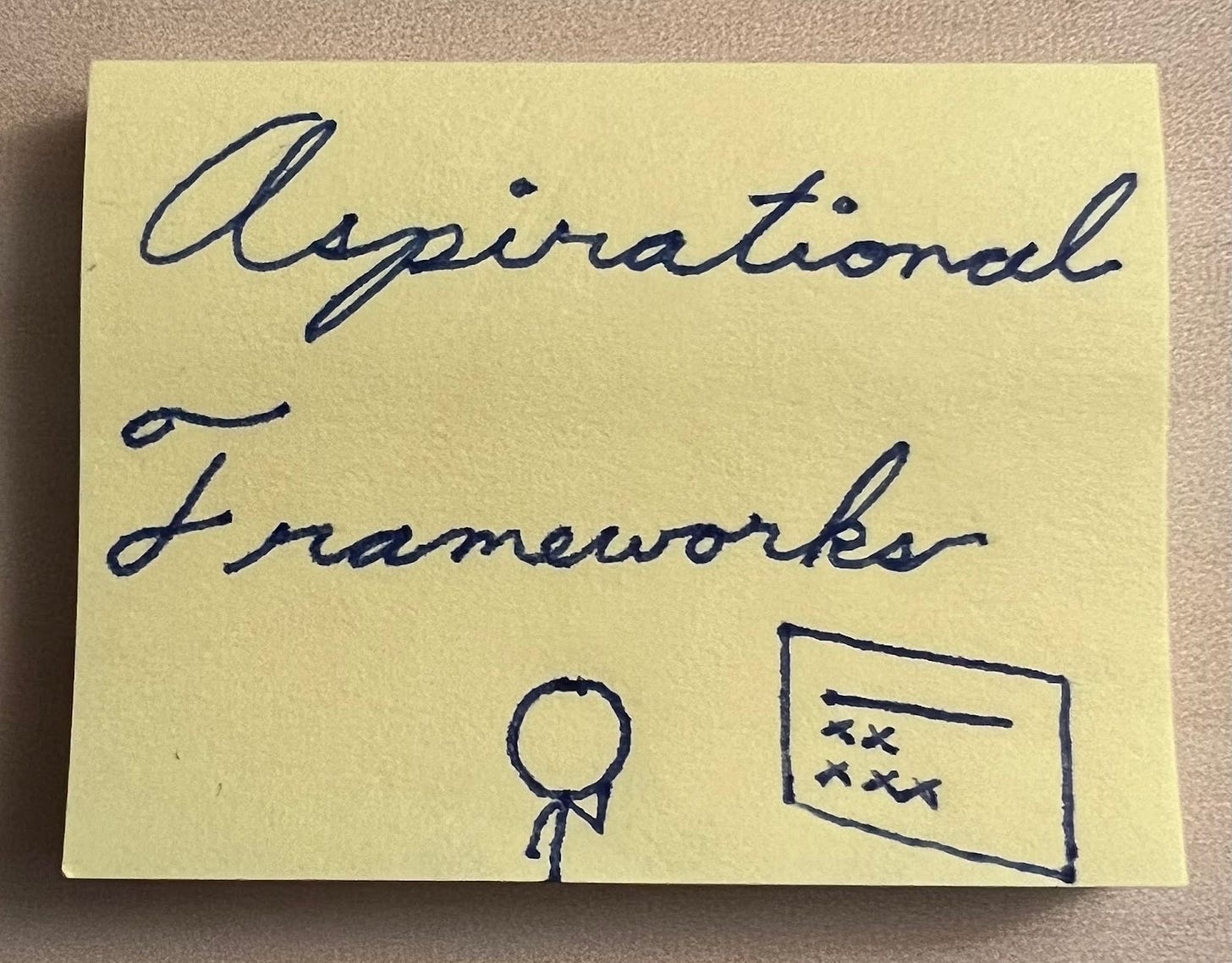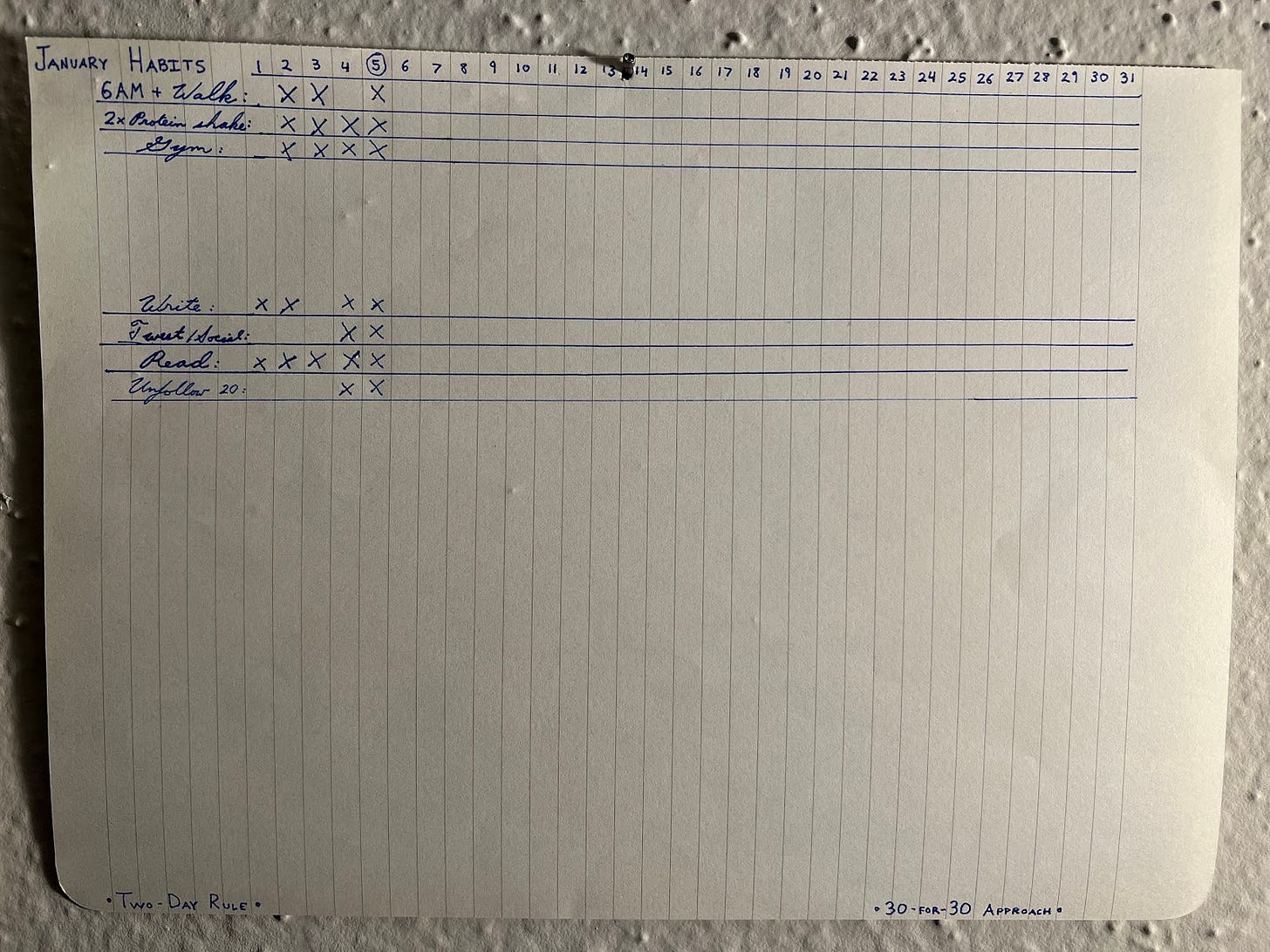Aspirational Frameworks
From Your Least Employed, Most Ambitious Friend
Welcome to Words with Wynn! If this is your first time perusing my content and you’d like more of my weekly musings, subscribe below:
Each year, I undergo my own little year end review and brainstorming session for the following year’s aspirations. I’ve been workshopping my 2023 goals with friends, mentors, and colleagues this week as I hammer away at exactly what I’m looking to accomplish this year. In that process, I’ve realized that my framework might be interesting to some of you.
My system is a bit convoluted, but I credit it with improving my discipline and personal accountability across my various pursuits (school, work, fitness, etc.). You may use part, all, or none of it.
For context, I came around to establishing a more formal goal setting habit my senior year of undergrad. It’s hard to pinpoint the precise beginning, but I recall a confluence of three things that really established this habit for me:
A mentor had shown me his own list of annual goals at a time that I was pretty much flying by the seat of my pants.
I began digesting some of Tim Ferriss’s content that gave me a better understanding of how to even set goals effectively.
Essentially, SMART goals, but presented in a less bullshitty, corporate hell kind of way.
Stumbling across The Strangest Secret by Earl Nightingale, a classic piece of self-help audio dating back to the 50’s.
Some of it is a bit dated, but I have returned to that recording a couple dozen times over the last decade. Worth the listen.
One of the most impactful metaphors from that recording is the following:
“Have you ever wondered why so many men work so hard and honestly without ever achieving anything in particular, and others don’t seem to work hard and yet seem to get everything? They have a magic touch.
You’ve heard them say that about someone. “Everything he touches turns to gold.”
Have you ever noticed that a man who becomes successful tends to continue to become successful? And on the other hand, have you noticed how a man who’s a failure tends to continue to fail?
Well, it’s because of goals. Some of us have them; some don’t. People with goals succeed because they know where they’re going.
Now think of a ship leaving a harbor and think of it with a complete voyage mapped out and planned. The captain and crew know exactly where it’s going and how long it will take. It has a definite goal. 9,999 times out of 10,000 it will get to where it started out to get.
Now let’s take another ship, just like the first, only let’s not put a crew on it, or a captain at the helm. Let’s give it no aiming point, no goal, and no destination. We just start the engines and let it go.
I think you’ll agree with me that if it gets out of the harbor at all, it will either sink or wind up on some deserted beach, a derelict. It can’t go any place because it has no destination and no guidance.”
The verbiage of ‘derelict’ specifically struck me, especially when read in Earl Nightingale’s rich, grainy voice. It paints a very precise picture in the mind’s eye. The juxtaposition between safe passage and beachside ruin is informative for highlighting the deterministic nature of a purposeful individual with specific direction (reaching your goals, or landing somewhere in the vicinity 99/100 times with a little hustle and a lot of patience) as opposed to an aimless wanderer.
With that in mind, I give you the patented Wynn Lemmons Aspirational Framework.
Annual Aspirations & Yearly Roadmap - Strategic Work
— Stagnant. Performed at the beginning of the year —
As mentioned above, I start each year sitting down with my thoughts for a few days and assessing what I’ve accomplished as well as where I’m going. This year I took a bit deeper stock of myself, and reviewed a number of ‘guru’s’ different methods for annual reviews to see if there was anything I’d like to add to my process (see: anti-goals). Surprise, surprise they all end up in about the same place doing some variation of my framework, essentially. So, maybe you’re in good hands.
Here’s a digitized version of the framework should you so desire it.
ASPIRATIONS

First, we start with our GOALS sheet. The purpose of my annual goals is to set an overarching tone for the year. These are written more high-level, strategically and often less tangibly than my more tactical monthly goals. I break my aspirations into four major life categories: Personal, Professional/Financial, Physical, and Experiential (previously Travel).
From there, it’s relatively self-explanatory. I write out my various goals within each category, and typically try to ensure that they are set with tangible, specific results in mind. Effective goal setting includes actionable goals with measurable outcomes. Admittedly (and referenced above), my annual goals are often more vague but I still try to keep it measurable when possible. My GOALS sheet itself will often include a few phrases here and there that I would like to keep in mind as overarching themes for the year, like this year’s reminder for time management: “It’s not a priority.” (see: article source and my tweet about it).
A new addition this year was the introduction of Anti-Goals (Sahil Bloom’s piece on them). Generally, this is visualizing the actions/systems/behaviors that will limit you from hitting your targets or represent the outcomes you’d like to avoid in pursuing your aspirations. I put my own spin on this exercise, and will be writing that up for next week.
Finally, in reaching the end of a year, reexamining your GOALS sheet is as informative for the milestones you missed as it is in seeing what you achieved. I draft my stagnant annual goals with the understanding that my priorities and aspirations will (and should) change over the course of a year, and I find it educational to see what changed each year and why.
ROADMAP
Now that we have our milestones, we need our roadmap. The roadmap is a forcing function to make you think about the timing of everything you want to achieve this year. It’s more a guiding exercise than anything else. Life is more exciting and variable than any rigid timeline we put on paper, and it’s expected that these timelines will be wrong. But it serves as a guiding force that leads me to think about precisely when and how I will need to perform various actions in order to achieve my overarching annual goals.
A couple simple, stupid stream-of-consciousness examples for you:
I haven’t gone camping the last couple years. I deeply regret this. My goal is to go camping twice this year. Ok, in order to achieve that, when will those trips most likely occur? Well, when the weather is good. Alright, so that means that I will likely need/want to go camping in the spring and fall. Therefore, I should put a couple camping trips on my roadmap in March and October.
I would like to read 24 books this year. Math says that’s two a month. Therefore, I put under each month “two books” for a reminder of pacing.
The follow-on activity that makes this roadmap really valuable (which I’m piloting this year), is taking the step of now going to my Google calendar and picking tentative dates for many of the things I want to do. Blocking out weekends for those camping trips, tentative days for a friend visit, some travel time, etc. These are largely placeholders, but add an additional layer of accountability when I see that marked weekend in March and hate myself for not having made a camping trip actually happen.
Monthly Goals & Minimum Viable Progress - Tactical Work
— Rolling. Performed at the beginning of each month. —
MONTHLY GOALS
My monthly goals are written on a 1/3/6mo rolling basis at the beginning of each month. Your targets will get increasingly intangible as the time frame extends. One month goals should be highly specific, measurable, and conquerable stepping stones: Read 50 pages, bench press 225lb 3x, get lunch with xyz. These should be distinct and achievable in order to drive momentum forward.
You will then lengthen these out, and envision how much you’d like to have accomplished in three months and six months. The purpose here, and with the monthly goals being written on a rolling basis, is to keep yourself looking out and forward regularly. These windows of time are short enough to feel graspable, yet long enough to accomplish some compound growth.
A couple simple, stupid stream-of-consciousness examples for you:
If I bench 225lb 3x this month and go to the gym four times a week, where will that put me in 3 months? Well, I’ll probably gain the 5lb in muscle I wanted to put on. Excellent. What’s that mean in 6 months? Well, 6 months will put me in summer and I’ll want to have cut by then. So 6 months goals should be to cut 10lb and look xyz way.
I want to write every day. I should write x words by the end of the month. If I perform this and am active in growing my audience on y platform, that should be z% audience/follower growth in 3 months. If I accomplish that, maybe there’s monetization in 6 months, so the goal could be “earn $1 from my writing” by that time.
MINIMUM VIABLE PROGRESS
And finally, a super simple bonus exercise for really building momentum and maintaining accountability: The Seinfeld Calendar Framework.
Ripped shamelessly from Sahil Bloom’s The 30-for-30 Challenge:
It’s a simple process, but the name of the game is Minimum Viable Progress. The purpose of this exercise is the absolute atomization of your goals. You leave yourself the smallest step to perform each day that will move you in the direction of your aspiration, and then build the momentum to get you there.
It also has the beauty of creating space to go ‘above and beyond’. My Minimum Viable Goal is to write for 10 minutes each day. The hardest part is sitting down at my desk, and once I’m there it’s rare that I’ll ONLY write for the minimum.
This is the same tip I hammer home to all of my friends attempting to get in shape. Just GET YOURSELF TO THE GYM. It’s fine if you plan to go in, walk on a treadmill for 5 minutes, and walk out. But if you can get yourself in the door consistently, that’s vastly more important than huge strides of accomplishment lifting 500lb once. It’s building a habit and momentum.
And an unattributed quote that really drives this home: “When you can’t be motivated, be persistent.”
I admit that all of this is very Wynn- deeply thoughtful and completely overengineered. That being said, I threw everything and the kitchen sink into this post with the hope that, although it’s unlikely that any of you will pick up all the insane practices I’ve listed, some of you will find one or two nuggets insightful/actionable from this.
Excited to see what each of you accomplish this year.
Thanks always and cheers to a big 2023.
- W







